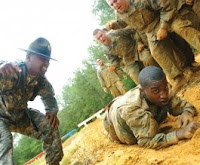
So, you're curious about ASL and, like me, found the idea of learning and playing the game a daunting task without anyone to tutor you in its finer points -- or even how to get started... Perhaps you've even picked up an ASL Starter Kit (#1-#3) or the ASLRB itself, but it's still not clicking.
For me, I found that the Internet has been a godsend in terms of aggregating information on how to start playing this wargame. Here is an annotated web bibliography for total newbies (and people who found the search term ASL on google to be a little less than expected):
1. "Richfam"'s ASL Tutorials #1-3 - (And #4 here with graphics even!) As mentioned in my last post, Boardgamegeek user "richfam" (Jay Richardson) has created the obsolutely best introduction to ASL that I've seen. If not for his tutorials I doubt I would have ever picked up the Starter Kits or even understood how to begin playing. Mr. Richardson has used a very easygoing, narrative style, to explain and break down the reasons for the rules. After reading his tutorials you can easily visualize the action. For example, his explanation for residual fire left by defensive first fire totally makes the system comprehensible. The Starter Kits just give you the rules and not the whys and wherefores. If you've picked up the official ASL Rulebook or perused the Starter Kits you'll understand the difference between legalese and narrative rule writing style immediately.
I'm not putting down the "ASL-ese" of the official stuff, since an experienced player would find that much more useful, but being introduced to the game with the richfam Tutorials has been basically akin to having an expert player around to show me the ropes. Kudos to Mr. Richardson! Many on BGG eagerly await the final installment of the tutorials (#5) which will address Armoured Fighting Vehicles (AFVs) aka TANKS!!!
(In my last post I wondered why richfam wasn't hired by MMP but I understand now that he has been employed in some capacity by them in their periodicals -- way to go!)
1.a. Boardgamegeek Files - Proceed immediately to these files and print them!
2. An Introductory Guide to ASL - I found this .pdf file hosted on the "View from the Trenches" website (VFTT being the long running British ASL newsletter) though it is also on BGG. It's not the easiest thing to absorb in order to learn the game but it's "official" in that it was ostensibly written by MMP, the publishers of ASL itself. Unless you have mucho experience in wargaming and/or have had at least some exposure to the game I don't see total newbs as gaining much other than having a very short but somewhat comprehensive summary of the game as a whole. The best reason to check out this guide is the FREE print and play stuff incorporated into it. A little bit of printer ink, glue and elbow grease will get you a small functional introductory scenario to start. As for View from the Trenches itself, all of its issues from the very very beginning are available on their website and fearless newbs should check them out.
3. EIGHT STEPS TO ASL: A Programmed Instruction Approach By Jim Stahler - Found on the MMP website itself, the document/article appears follow the standard wargame-style learning convention of "programmed instruction". That means that you are slowly given short chunks of rules to absorb and learn in increasingly more complicated scenarios. Hopefully, by instructions' end you'll have the full ruleset (or at least most of it) under your belt. Now, to be honest, this method isn't best given that the Starter Kits have superceded it and that this eight-step approach requires the financial commitment of at least the official Rulebook (~US$65 versus the Starter Kits' ~US$20-35 each) and the first module Beyond Valor (~US$90). I've included the link here though because I find it interesting how learning the game in the past without an experienced player would have been tediously and almost impossibly obtuse for the total newbie.
4. The 2 Half-Squads Podcast - Podcasting has finally come to the world of ASL. Of particular note is the sixth episode where they do a more concentrated job of focusing on how total newbs can learn the game. However, the 2 Half-Squads always make an effort to explain things in their broadcasts. Spontaneous and entertaining, Jeff and Dave's podcast is an easy listen -- I've burned the first ten episodes to MP3 to listen to on the daily commute and have enjoyed them immensely. For newbies, Jeff and Dave do a good job making ASL fun. The only caveat I have is that the first two episodes (possible three) have some serious technical issues (ironed out by the later episodes).
5. The ASL Webdex - The Webdex is a great, albeit slightly dated, compilation of web resources for ASL. It certainly shares a bit of the roughness of some of the early hamhanded efforts of ASLers on the Internet in its presentation. However, there is a LOT of good stuff there that is sub-divided into areas corresponding to the ASL full Rulebook. For newbies there is a dedicated page here.
6. ASL Forums on Gamesquad.com - Of course, no list of links would be complete without the obligatory site for forum goers. It seems that Gamesquad.com has garnered the most traffic in terms of sheer numbers of people (players and designers) who frequent its pages. There are a couple of other forums (such as on BGG) that are useful but Gamesquad is the most familiar in its usage and conventions and thus the most newbie friendly. Check out the Starter Kit-dedicated forum for best support.
7. Daniel Savarese's ASLSK #1 Programmed Instruction - I discovered this site after I had bought and played SK1 with the richfam Tutorials (here is the whole of the Savarese document in .pdf format). It is an excellent resource that complements the Tutorials. I highly recommend it with all the resources from BGG above as you start the SKs.
Well, when I started this post I didn't think it would get so big so I'm splitting it up into two! The second post will deal with stuff for the "less" total newbie (does that make any sense?!) ...
As an ASL neophyte I found that simply skimming the stuff on ASL available on the web was a valuable experience. Sometimes I imagine learning ASL on my own pre-Internet or pre-BBS days and I cringe in horror -- no wonder there are so many posts by people who talk about buying ASL when it was first published but never actually playing it due to its practically insurmountable learning "cliff". All hail Al Gore's creation! Part Two up soon...






